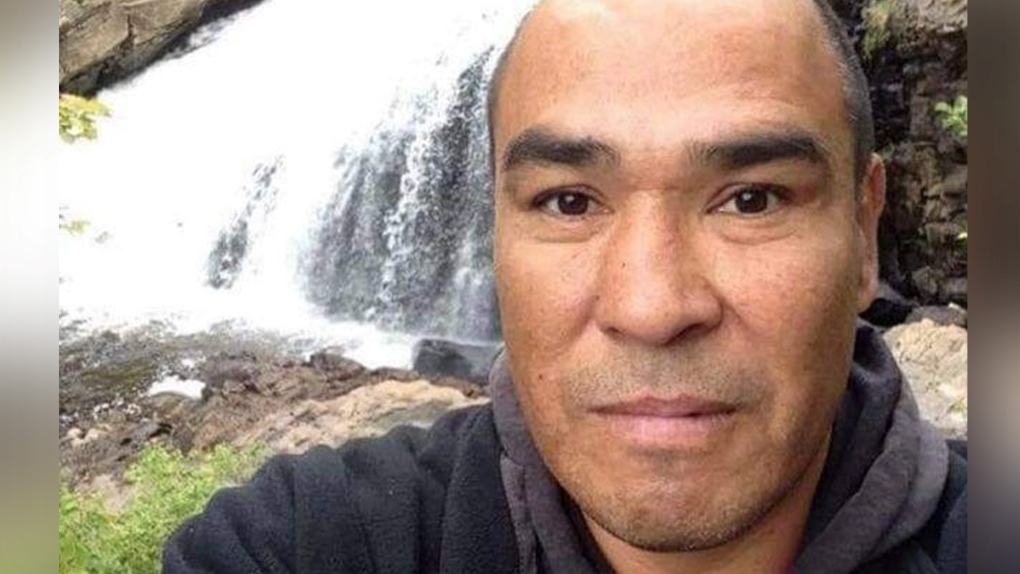A year after Raphael Andre's death on Montreal street, advocates ask what's changed
Exactly a year ago, 51-year-old Raphael Andre died overnight just steps from the shelter where he'd been keeping warm during the day.
Andre's death made headlines beyond Canada last year, but those who work with the homeless in Montreal say there still aren't enough services during COVID-19 to keep them out of danger.
Just last week, a 74-year-old man froze to death in his makeshift shelter in NDG when, according to those who knew him, he could no longer seek shelter in his usual last resort, a nearby McDonald's, due to public health restrictions.
Andre, who was Innu, had been using the Open Door shelter as a place to eat and shower. But under COVID-19 rules, it was forced to close the night of Jan. 18, 2021.
Andre was under the influence at the time and sought shelter in a porta-potty on the nearby street, where he fell asleep and died.
 Raphael Andre froze to death overnight on Saturday just steps from a downtown Montreal shelter closed for curfew. (Photo: Facebook)
Raphael Andre froze to death overnight on Saturday just steps from a downtown Montreal shelter closed for curfew. (Photo: Facebook)
After his death, Resilience Montreal and other partners opened a warming tent in Cabot Square, just west of downtown, naming it after him.
Its organizers say it's seen tens of thousands of visits in the last year, another sign of how serious the need for services is.
Nakuset of the Montreal Native Women's Shelter says the tent is not enough, and there needs to be a building in the same area that's open overnight.
Her organization started a new local shelter but it's only open during the day.
For now, the warming tent will stay open until at least March 21.
CTVNews.ca Top Stories

B.C. tenants evicted for landlord's use after refusing large rent increase to take over neighbouring suite
Ashley Dickey and her mother rented part of the same Coquitlam duplex in three different decades under three different landlords.
MPP Sarah Jama asked to leave Ontario legislature for wearing keffiyeh
MPP Sarah Jama was asked to leave the Legislative Assembly of Ontario by House Speaker Ted Arnott on Thursday for wearing a keffiyeh, a garment which has been banned at Queen’s Park.
Mountain guide dies after falling into a crevasse in Banff National Park
A man who fell into a crevasse while leading a backcountry ski group deep in the Canadian Rockies has died.
Expert warns of food consumption habits amid rising prices
A new survey by Dalhousie University's Agri-Food Analytics Lab asked Canadians about their food consumption habits amid rising prices.
Here's why provinces aren't following Saskatchewan's lead on the carbon tax home heating fight
After Prime Minister Justin Trudeau said the federal government would still send Canada Carbon Rebate cheques to Saskatchewan residents, despite Saskatchewan Premier Scott Moe's decision to stop collecting the carbon tax on natural gas or home heating, questions were raised about whether other provinces would follow suit. CTV News reached out across the country and here's what we found out.
Montreal actress calls Weinstein ruling 'discouraging' but not surprising
A Montreal actress, who has previously detailed incidents she had with disgraced Hollywood producer Harvey Weinstein, says a New York Court of Appeals decision overturning his 2020 rape conviction is 'discouraging' but not surprising.
Charlie Woods, son of Tiger, shoots 81 in U.S. Open qualifier
Charlie Woods failed to advance in a U.S. Open local qualifying event Thursday, shooting a 9-over 81 at Legacy Golf & Tennis Club.
Caleb Williams, Jayden Daniels and Drake Maye make it four NFL drafts with quarterbacks going 1-3
Caleb Williams is heading to the Windy City, aiming to become the franchise quarterback Chicago has sought for decades.
Improve balance and build core strength with this exercise
When it comes to cardiovascular fitness, you may tend to focus on activities that move you forward, such as walking, running and cycling.

































